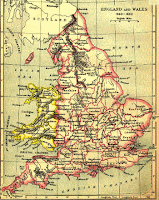I’m taking a left, sort of metaphysical, turn on this
month’s topic. Instead of considering
where in the world I would go, I’ve decided to talk about where our characters
come from as in their back-story. This
was prompted by a brief quote I had saved in 2010 and found--while looking for
something else to use to spark off a blog this month..
“Anthropologists claim geography is destiny. Which means
where we set our stories will shape our characters in fundamental ways. How do
you decide which setting you need for your type of story?” Does geography determine who and what or why
our characters are the way they are? (I
found in doing some googling that in the real world there is a vast,
multitudinous debate on all stands pro and con on geography as destiny. I am not a proponent of any views, just an
explorer!)
One book I discovered (which I neither recommend or contest
because I have NOT read it) Power of
Place by Harm de Blij, really got me thinking because of its Table of
Contents--thanks to Amazon’s Look Inside.
Some of the chapter titles in Place--
“Imperial Legacy of Language; Fateful Geography of Religion, Rough
Topography of Human Health, Geography of Jeopardy, Same Place-Divergent
Destinies; Power and the City, Promise and Peril in the Provinces,” started me
thinking about how I choose my characters’ backgrounds. I am taking the topics far more literally
than the author.)
 In my Honour series, André Ribeymon, Baron de la Croix is a
French émigré whose parents were killed by a mob in France during the Reign of
Terror in the early 1790’s. He was six
at the time and was rescued and taken to England by his aunt. She weds an earl
and they raise the boy and his sister. The earl was a British agent and de la Croix admires and respects him. André decides to follow his example and becomes a British spy working to overthrow Napoleon.
In my Honour series, André Ribeymon, Baron de la Croix is a
French émigré whose parents were killed by a mob in France during the Reign of
Terror in the early 1790’s. He was six
at the time and was rescued and taken to England by his aunt. She weds an earl
and they raise the boy and his sister. The earl was a British agent and de la Croix admires and respects him. André decides to follow his example and becomes a British spy working to overthrow Napoleon.
Then there is his counterpart, Donatien. He is slightly older than André but was
born and reared in France. Born on the "other-side-of-the-blanket" and raised in a dissolute aristocratic household he comes to admire survival. As an
adolescent he was part of the “mob” and as an adult has become a master spy
working for Napoleon, or perhaps more correctly, for his own advancement via
Napoleon or whomever he can use.
These two men speak the same languages, their health is equally
good, they both deal with jeopardy in many different forms, reside mainly in
the city albeit one in London and the other in Paris and are familiar with the
provinces of both countries. They
began their lives very much closer geographically than they realize. Are their adult decisions merely Same Place-Divergent Destinies? In the case of these two men I believe it was more a
matter of who raised them than of geography although the political geography did have a huge influence and open possibilities neither would have had otherwise.
One grew up within a sound family
life with examples of moral living and the other had the exact opposite. They both have chosen “good” but its
definition is very different for each. But I do need to add that Donatien, a totally amoral unflinching sort, really surprised me when I was writing Honour's Redemption in that he showed a glimmer of a heart. It will be interesting to see how that develops, or does not, in book five.
Does it matter what setting our characters come from? Does it make a difference in who they become? It does to some extent just like
where I was raised had an effect on me and the kinds of characters I
create. I don’t think its nature versus
nurture but a combination of the two that mold a person. My experiences and beliefs create different
characters than yours would even if we were both given the same basic
character. Agree? Disagree?
Why?



1 comments:
Agreed. I find it fascinating that no two people will write the same thing after have been given the same data to work with. (Especially that last sentence. Sheesh. )
Great food for thought.
Post a Comment